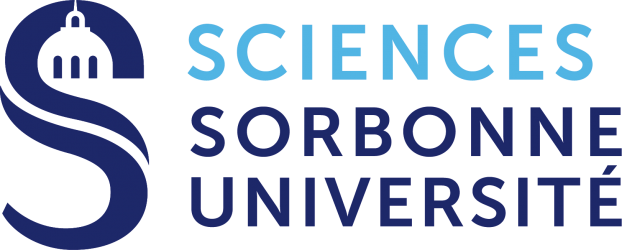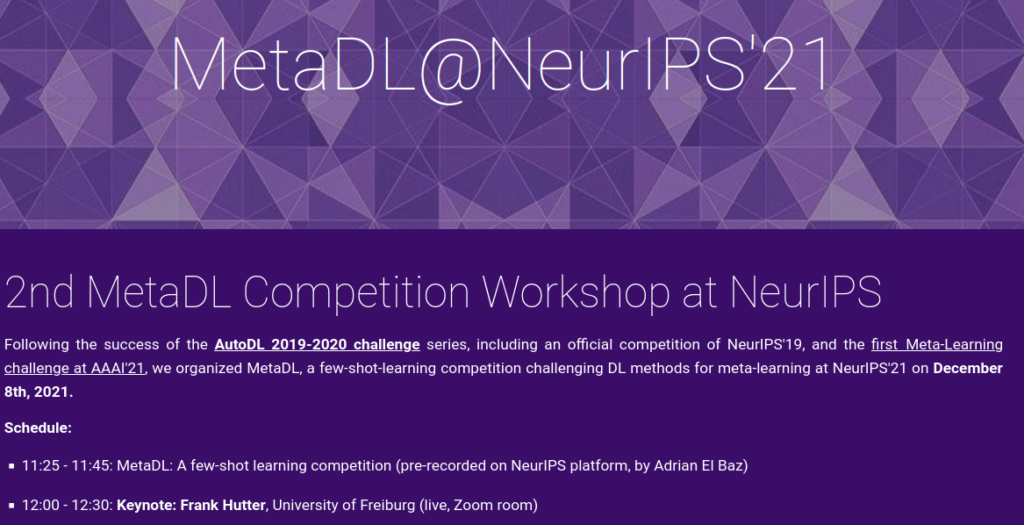
MetaDL Competition
Institute of Advanced Research in Artificial Intelligence
IA Pau 4
Generative Modelling GenHack Data Science Challenge
Students can enroll in the competition from competitions.outcoder.ai/competitions/genm.Enrollment deadline is the 15 October 2021 at midnight Paris time (GMT+2). Teams can be created after enrolling.

AI Competition -BNP Parisbas
I contact you on behalf of École Polytechnique and BNP Paribas to announce to you the Generative Modelling GenHack Data Science Challenge
The GenHack challengeis an exciting opportunity for your students to improve and apply their skills in a challenging, international environment on a real-world industrial problem.
The task
This is an unsupervised learning problem: Given real data from stock market indexes that will act as a train dataset, the task is to develop a generative model that simulates synthetic stock market indexes.
🗓 When?
The competition will begin the 25th of October and will end the 22nd of November.
🤖 How?
- Kick-off presentation on the 15th of October with the different stakeholders from BNP Paribas and Ecole Polytechnique.
- Teams of 3-5 students (ideally from different universities and different countries).
- Mentoring from academic experts and senior Data Scientists from BNP Paribas
.
🏆 The Prize?
- Present in front of the jury of École Polytechnique and BNP Paribas
- Monetary prizes, unveiled at a later date
- Discover BNP Paribas’s “métiers” during an exclusive event
💎 The Sponsors?
- École Polytechnique, with the chaire ‘Stress Test: RISK Management and Financial Steering’ led by Professor Emmanuel Gobet.
- BNP Paribas, with Léa Deleris, Head of RISK Artificial Intelligence Research, and Antoine Bezat, Head of Stress Testing Methodologies and Models
Is this something that you think your students could be interested in?
If so, please download from here the competition poster that you can share by email or hang on the wall of your Master’s classrooms.
Here is the platform where the students can sign up: competitions.outcoder.ai/competitions/genm
Enrollment deadline is the 15 October 2021 at midnight Paris time (GMT+2). Teams can be created after enrolling.
Please tell us if this is something you think your students will be interested in and if you have any questions.
Kind regards,
On behalf of the organizing committee
Luca Zanna, Outcoder.ai
ML Reproducibility Challenge 2021
We are happy to announce the official launch of the ML Reproducibility Challenge 2021 [1] (RC2021)!
Over the last four years we have hosted a series of Machine Learning reproducibility challenges, in partnership with PapersWithCode and OpenReview (see V1 [2], V2 [3], V3 [4], V4 [1]). The challenges have led to several reproducibility reports, some of which were published in three volumes of the journal ReScience (see J1 [5], J2 [6], J3 [7]), and have helped emphasize the importance of reproducibility, sound scientific methodology, and robust results. Course instructors have incorporated the ML reproducibility challenge as a component of their course, typically as the final course project.
For more details, our blog post [8] describes how educators can incorporate the ML reproducibility challenge into their course curriculum. You may also read the experience of course instructors at University of Amsterdam on using the Reproducibility Challenge as a course requirement in their blog post [9]. If you are teaching a course where this may be appropriate, we strongly encourage you to participate! If you are a student in an ML course and want to participate in it, you are more than welcome, and we encourage you to share this information to your instructor/TAs. Submissions are also most welcome from the industry as well.
We will be accepting reproducibility reports of papers published in:
* ICML 2021 Accepted Papers
* ICLR 2021 Accepted Papers
* NeurIPS 2021 Accepted Papers
* ACL-IJCNLP 2021 Accepted Papers
* EMNLP 2021 Accepted Papers
* CVPR 2021 Accepted Papers
* ICCV 2021 Accepted Papers
* AAAI 2021 Accepted Papers
* IJCAI 2021 Accepted Papers
Key Dates:
* Notification of the challenge: August 31st, 2021
* Deadline to submit reports: February 4th, 2022
* Notification of acceptance: May 15th, 2022
More information regarding the task and related resources are available on our website [1]. Reports will undergo a comprehensive review process, and selected reports will be featured in ReScience journal [10], as well as linked to their original papers in PapersWithCode [11]. If you are a course instructor and choose to include this in your course, please fill out this form [12] to feature your course on our website! All information will be treated confidentially and used only to send important updates related to this challenge.
We hope you will participate in this challenge, include this in your course, and encourage your colleagues and students to participate!
Koustuv Sinha, Jesse Dodge, Sasha Luccioni, Jessica Forde, Robert Stojnic and Joelle Pineau 2021 ML Reproducibility Challenge [1] Organizing Team
Links:
——
[1] https://paperswithcode.com/rc2021
[2] https://www.cs.mcgill.ca/~jpineau/ICLR2018-ReproducibilityChallenge.html
[3] https://www.cs.mcgill.ca/~jpineau/ICLR2019-ReproducibilityChallenge.html
[4] https://reproducibility-challenge.github.io/neurips2019/
[5] https://rescience.github.io/read/#volume-5-2019
[6] https://rescience.github.io/read/#volume-6-2020
[7] https://rescience.github.io/read/#volume-7-2021
[8] https://medium.com/paperswithcode/the-reproducibility-challenge-as-an-educational-tool-cd1596e3716c
[9] https://medium.com/paperswithcode/case-study-how-your-course-can-incorporate-the-reproducibility-challenge-76e260a2b59
[10] https://rescience.github.io/
[11] https://paperswithcode.com/
[12] https://forms.gle/4ogw4QrTQacjj4h37
[13] https://paperswithcode.com/rc2020
[14] https://docs.google.com/forms/d/e/1FAIpQLSfNDVkj4slprEYXSuR2Vb8in8dGQnwPU-ShkVIW93cyroZOrA/viewform
PlankThon Challenge
Student competition best of 8ECM
ICLR 2021 Challenge de géométrie et topologie numériques
ICLR 2021 Challenge de géométrie et topologie numériques
Les jeux de données modernes appartiennent souvent à des espaces de dimension élevée. Cependant, ces données possèdent aussi des structures intrinsèques qui peuvent être découvertes par des méthodes de géométrie et topologie numériques. Pour cette raison, les approches utilisant de la géométrie et de la topologie en analyse de données gagnent en popularité chaque année.
Le but de ce challenge est de faire progresser la recherche en géométrie et topologie numériques. Le challenge demande aux participants de coder la meilleure analyse de données, méthode computationnelle, ou expérience numérique en utilisant des librairies Python de géométrie et topologie numériques. Tous les participants auront l’opportunité d’être co-auteurs sur le papier qui résumera les conclusions du challenge.
La page GitHub du challenge contient plus de détails sur les conditions de la compétition: https://github.com/geomstats/challenge-iclr-2021.
Deadline: 2 mai, 2021 23:59 PST (Pacific Standard Time).
Prix:
Les gagnants seront annoncés lors de la conférence ICLR 2021, au Virtual Workshop on Geometrical & Topological Representation Learning.
Les prix sont les suivants:
• 2000$ pour la première place,
• 1000$ pour la seconde place,
• 500$ pour la troisième place.Nous sommes impatients de lire vos contributions !




